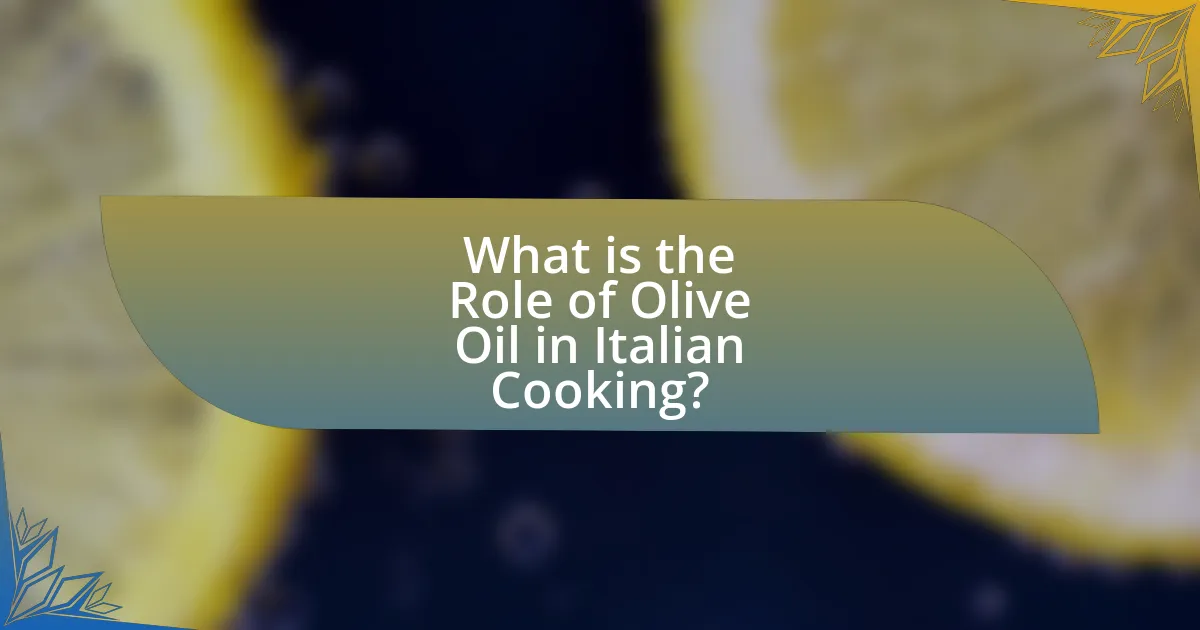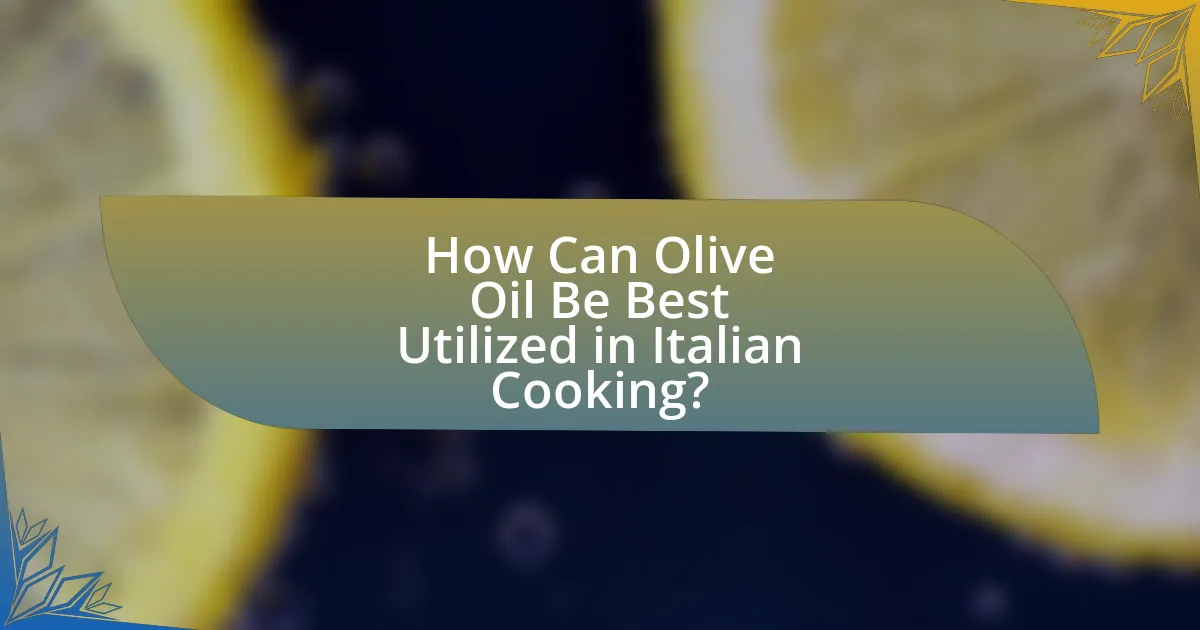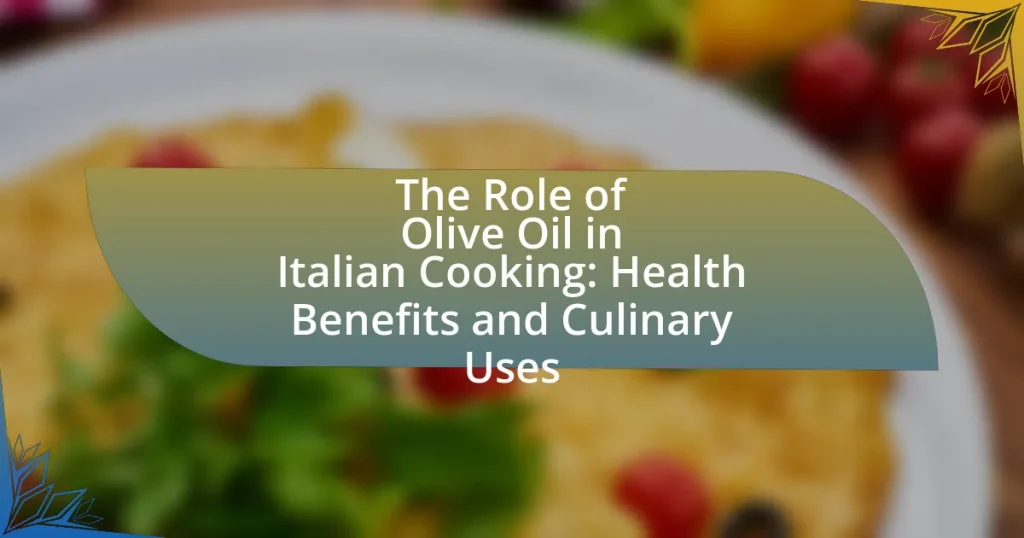Olive oil is a fundamental ingredient in Italian cooking, known for its flavor, health benefits, and versatility. It serves various culinary purposes, including sautéing, dressing salads, and enhancing traditional dishes like pasta sauces and marinades. The article explores the historical roots of olive oil in Italy, its integral role in enhancing flavors, and its health benefits, particularly in relation to the Mediterranean diet. Additionally, it discusses the different types of olive oil, their quality, and best practices for utilization in cooking, emphasizing the importance of high-quality extra virgin olive oil for both taste and nutritional value.

What is the Role of Olive Oil in Italian Cooking?
Olive oil serves as a fundamental ingredient in Italian cooking, providing flavor, health benefits, and versatility. It is used for sautéing, dressing salads, drizzling over dishes, and as a base for sauces, enhancing the overall taste and nutritional profile of meals. The Mediterranean diet, which emphasizes olive oil, is associated with lower risks of heart disease and improved longevity, supported by studies such as those published in the New England Journal of Medicine, which highlight the health benefits of olive oil consumption.
How is Olive Oil Integral to Italian Cuisine?
Olive oil is integral to Italian cuisine as it serves as a primary cooking fat and flavor enhancer in a wide variety of dishes. Its use dates back to ancient times, with Italy being one of the largest producers of olive oil globally, contributing to its culinary identity. Olive oil is essential in traditional recipes such as pasta sauces, dressings, and marinades, where it not only adds richness but also enhances the flavors of fresh ingredients. Additionally, studies have shown that olive oil, particularly extra virgin, contains healthy monounsaturated fats and antioxidants, which contribute to the Mediterranean diet’s health benefits, further solidifying its role in Italian cooking.
What are the historical roots of Olive Oil in Italy?
The historical roots of olive oil in Italy date back to ancient times, specifically around 2000 BC when the Minoans and Mycenaeans cultivated olive trees. The Greeks later introduced olive oil to Italy, where it became integral to Roman culture by the 1st century AD, as evidenced by texts from Pliny the Elder and Columella, who documented its agricultural significance and culinary uses. Olive oil production expanded throughout the Italian peninsula, leading to the establishment of various regional varieties, which are still celebrated today.
How does Olive Oil influence traditional Italian dishes?
Olive oil significantly influences traditional Italian dishes by enhancing flavor, providing health benefits, and serving as a key cooking medium. Its rich, fruity taste complements ingredients commonly used in Italian cuisine, such as tomatoes, garlic, and herbs, elevating the overall dish profile. Additionally, olive oil is known for its health benefits, including high levels of monounsaturated fats and antioxidants, which contribute to heart health and reduce inflammation. Studies, such as those published in the “Journal of Nutritional Biochemistry,” highlight that the Mediterranean diet, which prominently features olive oil, is associated with lower rates of chronic diseases. Thus, olive oil is not only a fundamental ingredient in Italian cooking but also a contributor to the healthfulness of traditional dishes.
Why is Olive Oil Considered a Staple in Italian Cooking?
Olive oil is considered a staple in Italian cooking due to its integral role in flavoring, cooking techniques, and health benefits. It serves as a primary fat for sautéing, dressing salads, and drizzling over finished dishes, enhancing the overall taste and aroma of Italian cuisine. Historically, Italy has been one of the largest producers of olive oil, with regions like Tuscany and Liguria renowned for their high-quality oils, which are often used in traditional recipes. Additionally, olive oil is rich in monounsaturated fats and antioxidants, contributing to the Mediterranean diet’s reputation for promoting heart health and longevity.
What are the different types of Olive Oil used in Italian cuisine?
The different types of olive oil used in Italian cuisine include Extra Virgin Olive Oil, Virgin Olive Oil, Pure Olive Oil, and Light Olive Oil. Extra Virgin Olive Oil is the highest quality, made from the first cold pressing of olives, and contains less than 0.8% acidity, making it ideal for dressings and finishing dishes. Virgin Olive Oil, also from the first pressing, has slightly higher acidity and is suitable for cooking. Pure Olive Oil is a blend of refined and virgin oils, offering a milder flavor, while Light Olive Oil, despite its name, refers to a lighter flavor and not lower calories, making it suitable for high-heat cooking. These distinctions are crucial for chefs and home cooks in selecting the appropriate oil for various culinary applications.
How does the quality of Olive Oil affect culinary outcomes?
The quality of olive oil significantly affects culinary outcomes by influencing flavor, aroma, and nutritional value. High-quality extra virgin olive oil, which is cold-pressed and free from defects, enhances dishes with its rich, fruity flavors and peppery notes, while lower-quality oils may taste rancid or bland. Studies show that high-quality olive oil contains higher levels of antioxidants and healthy fats, which contribute to both taste and health benefits, making it a crucial ingredient in Italian cooking. For instance, a study published in the Journal of Agricultural and Food Chemistry found that extra virgin olive oil retains more polyphenols, which are beneficial for health, compared to refined oils. Thus, the choice of olive oil directly impacts the sensory experience and healthfulness of culinary creations.
What Culinary Techniques Utilize Olive Oil in Italian Cooking?
Culinary techniques that utilize olive oil in Italian cooking include sautéing, dressing, marinating, and drizzling. Sautéing involves cooking ingredients quickly in olive oil over medium to high heat, enhancing flavors while retaining nutrients. Dressing salads with olive oil provides a rich flavor and healthy fats, while marinating meats or vegetables in olive oil infuses them with moisture and taste. Drizzling olive oil over finished dishes adds a finishing touch, enhancing both flavor and presentation. These techniques are foundational in Italian cuisine, emphasizing the quality and flavor of olive oil as a key ingredient.
How is Olive Oil used in cooking methods like sautéing and frying?
Olive oil is commonly used in cooking methods like sautéing and frying due to its ability to enhance flavor and provide health benefits. When sautéing, olive oil is heated in a pan to cook vegetables or proteins quickly over medium to high heat, allowing for the retention of nutrients and flavors. In frying, olive oil can be used for shallow or deep frying, where its high smoke point (around 375-410°F for extra virgin olive oil) makes it suitable for cooking at higher temperatures without breaking down. Studies have shown that olive oil contains monounsaturated fats, which are beneficial for heart health, making it a preferred choice in Italian cooking.
What role does Olive Oil play in dressings and marinades?
Olive oil serves as a fundamental ingredient in dressings and marinades, primarily acting as an emulsifier that binds oil with vinegar or other liquids. This emulsification enhances the texture and mouthfeel of dressings, allowing for a smoother and more cohesive mixture. Additionally, olive oil contributes rich flavors and aromas, elevating the overall taste profile of salads and marinated dishes. Its high content of monounsaturated fats and antioxidants, such as oleocanthal, also provides health benefits, including anti-inflammatory properties, which are particularly beneficial in Mediterranean diets.

What are the Health Benefits of Olive Oil?
Olive oil offers numerous health benefits, primarily due to its high content of monounsaturated fats and antioxidants. Research indicates that regular consumption of olive oil can reduce the risk of heart disease by improving cholesterol levels and lowering blood pressure. A study published in the New England Journal of Medicine found that a Mediterranean diet rich in olive oil significantly decreased cardiovascular events among participants. Additionally, olive oil possesses anti-inflammatory properties, which can help mitigate chronic inflammation linked to various diseases, including arthritis and certain cancers. The presence of polyphenols in olive oil also contributes to its antioxidant effects, protecting cells from oxidative stress.
How does Olive Oil contribute to a healthy diet?
Olive oil contributes to a healthy diet primarily through its high content of monounsaturated fats, which are beneficial for heart health. These fats help reduce bad cholesterol levels, thereby lowering the risk of heart disease. Additionally, olive oil is rich in antioxidants, such as vitamin E and polyphenols, which combat oxidative stress and inflammation in the body. Research published in the “New England Journal of Medicine” indicates that a Mediterranean diet rich in olive oil can significantly reduce the incidence of cardiovascular events. This evidence supports the role of olive oil as a key component in promoting overall health and well-being.
What are the nutritional components of Olive Oil?
Olive oil primarily consists of healthy fats, predominantly monounsaturated fatty acids, which make up about 73% of its total fat content. Additionally, it contains polyunsaturated fatty acids (approximately 11%) and saturated fatty acids (around 14%). Olive oil is also rich in antioxidants, particularly vitamin E and phenolic compounds, which contribute to its health benefits. Studies have shown that these components can help reduce inflammation and lower the risk of chronic diseases, supporting the notion that olive oil is a key element in a healthy diet.
How does Olive Oil impact heart health?
Olive oil positively impacts heart health by reducing the risk of cardiovascular diseases. This effect is primarily attributed to its high content of monounsaturated fats, particularly oleic acid, which can lower bad cholesterol levels (LDL) while maintaining or increasing good cholesterol levels (HDL). Studies, such as those published in the “New England Journal of Medicine,” have shown that a Mediterranean diet rich in olive oil is associated with a significant reduction in heart disease risk, with a 30% lower incidence of cardiovascular events compared to low-fat diets. Additionally, olive oil contains antioxidants like polyphenols, which have anti-inflammatory properties that further support heart health.
Why is Extra Virgin Olive Oil Particularly Beneficial?
Extra Virgin Olive Oil is particularly beneficial due to its high content of monounsaturated fats and antioxidants, which contribute to heart health and reduce inflammation. Studies have shown that the oleic acid in Extra Virgin Olive Oil can lower bad cholesterol levels while increasing good cholesterol, thus promoting cardiovascular health. Additionally, it contains polyphenols, which have been linked to reduced oxidative stress and lower risks of chronic diseases, including certain cancers and neurodegenerative disorders. The Mediterranean diet, which emphasizes the use of Extra Virgin Olive Oil, has been associated with a lower incidence of heart disease and improved longevity, further validating its health benefits.
What distinguishes Extra Virgin Olive Oil from other types?
Extra Virgin Olive Oil is distinguished from other types by its production process, which involves cold pressing olives without the use of chemicals or excessive heat, resulting in a higher quality oil with superior flavor and nutritional value. This type of olive oil must have an acidity level of less than 0.8% and pass a sensory evaluation by a panel of experts to ensure it meets the standards for taste and aroma. In contrast, other types of olive oil, such as refined or pure olive oil, may undergo chemical processing and can have higher acidity levels, leading to a less robust flavor profile and diminished health benefits.
How does the processing of Extra Virgin Olive Oil affect its health benefits?
The processing of Extra Virgin Olive Oil (EVOO) significantly impacts its health benefits by preserving its polyphenol content, which is crucial for antioxidant properties. Cold-pressing, the primary method for producing EVOO, maintains higher levels of these beneficial compounds compared to refined oils, which undergo heat and chemical treatments that can degrade nutrients. Studies indicate that EVOO retains about 30-50% more polyphenols than refined olive oils, contributing to cardiovascular health and anti-inflammatory effects. Therefore, the processing method directly correlates with the nutritional quality and health-promoting properties of Extra Virgin Olive Oil.
What Scientific Studies Support the Health Benefits of Olive Oil?
Numerous scientific studies support the health benefits of olive oil, particularly its role in reducing cardiovascular disease risk and promoting overall health. For instance, a study published in the New England Journal of Medicine in 2013, known as the PREDIMED trial, demonstrated that a Mediterranean diet enriched with extra virgin olive oil significantly reduced the incidence of major cardiovascular events by 30% compared to a low-fat diet. Additionally, research published in the Journal of Nutritional Biochemistry in 2018 highlighted that the polyphenols in olive oil possess anti-inflammatory and antioxidant properties, contributing to improved heart health and reduced oxidative stress. These studies collectively affirm the health benefits of olive oil as a key component of a healthy diet.
What findings have been published regarding Olive Oil and chronic diseases?
Research indicates that olive oil consumption is associated with a reduced risk of chronic diseases, particularly cardiovascular diseases and certain cancers. A study published in the New England Journal of Medicine found that a Mediterranean diet enriched with extra virgin olive oil significantly lowered the incidence of major cardiovascular events among high-risk individuals. Additionally, the European Journal of Cancer Prevention reported that olive oil’s high levels of monounsaturated fats and antioxidants, such as polyphenols, contribute to its protective effects against breast cancer. These findings underscore the health benefits of incorporating olive oil into daily diets, particularly in the context of Mediterranean dietary patterns.
How do Mediterranean diets featuring Olive Oil compare to other diets?
Mediterranean diets featuring olive oil are generally considered healthier than many other diets due to their emphasis on whole foods, healthy fats, and nutrient-rich ingredients. Research indicates that the Mediterranean diet, which includes olive oil as a primary fat source, is associated with lower risks of heart disease, stroke, and certain cancers. A study published in the New England Journal of Medicine found that participants following a Mediterranean diet supplemented with extra-virgin olive oil had a 30% lower risk of cardiovascular events compared to those on a low-fat diet. This highlights the superior health benefits of Mediterranean diets that incorporate olive oil compared to other dietary patterns.

How Can Olive Oil Be Best Utilized in Italian Cooking?
Olive oil can be best utilized in Italian cooking by using it as a primary ingredient for dressings, marinades, and cooking methods such as sautéing and roasting. Its rich flavor enhances dishes like salads, pasta, and grilled vegetables. For instance, extra virgin olive oil is often drizzled over Caprese salad to elevate its taste, while it serves as a base for sauces like pesto. Additionally, studies show that olive oil contains monounsaturated fats, which contribute to heart health, making it a healthier choice for cooking compared to other fats.
What are some tips for selecting high-quality Olive Oil?
To select high-quality olive oil, look for extra virgin olive oil, which is the highest grade and indicates minimal processing. Check for a harvest date on the label, as fresher oil retains better flavor and health benefits; ideally, it should be consumed within 18 months of harvest. Additionally, choose oils in dark glass bottles or tins to protect against light exposure, which can degrade quality. Finally, consider the region of origin; oils from regions like Tuscany or Andalusia are often recognized for their superior quality due to strict production standards.
How can you identify authentic Extra Virgin Olive Oil?
To identify authentic Extra Virgin Olive Oil, examine the label for certification seals, such as the PDO (Protected Designation of Origin) or PGI (Protected Geographical Indication), which indicate quality and origin. Authentic Extra Virgin Olive Oil must have an acidity level of less than 0.8% and should be cold-pressed, meaning it was extracted without heat, preserving its flavor and nutrients. Additionally, a sensory evaluation can help; genuine oil has a distinct fruity aroma and a peppery or bitter taste, indicating high-quality olives. Studies show that oils meeting these criteria have higher levels of antioxidants and beneficial compounds, reinforcing their authenticity and health benefits.
What storage practices help maintain Olive Oil quality?
To maintain olive oil quality, it should be stored in a cool, dark place, ideally between 14-18 degrees Celsius, and in a tightly sealed container to prevent oxidation. Exposure to light, heat, and air can degrade the oil, leading to rancidity and loss of flavor. Studies indicate that olive oil stored in dark glass bottles or stainless steel containers retains its quality longer than those in clear or plastic containers. Additionally, keeping olive oil away from strong odors and frequent temperature fluctuations further preserves its integrity.
What are some common mistakes to avoid when using Olive Oil in cooking?
Common mistakes to avoid when using olive oil in cooking include overheating the oil, which can degrade its flavor and health benefits. Olive oil has a lower smoke point compared to other oils, typically around 375-410°F (190-210°C) for extra virgin olive oil, meaning it can start to smoke and lose its nutritional properties if heated too high. Another mistake is using low-quality olive oil, which may contain additives or be improperly processed, compromising both taste and health benefits. Additionally, not storing olive oil properly, such as exposing it to light or heat, can lead to rancidity, diminishing its quality. Lastly, using olive oil for deep frying is often discouraged, as it is better suited for sautéing, drizzling, or dressing due to its flavor profile and health properties.
How can overheating Olive Oil affect its flavor and health benefits?
Overheating olive oil can significantly diminish its flavor and health benefits. When olive oil is heated beyond its smoke point, which typically ranges from 350°F to 410°F depending on the type, it undergoes chemical changes that lead to the formation of harmful compounds and a loss of its characteristic taste. Specifically, the oil can develop a bitter or burnt flavor, masking its natural fruity and peppery notes. Additionally, overheating can degrade beneficial antioxidants, such as polyphenols, and healthy fats, reducing the oil’s nutritional value. Studies have shown that excessive heat can lead to the production of free radicals, which are linked to various health issues, including inflammation and oxidative stress. Therefore, maintaining appropriate cooking temperatures is crucial to preserving both the flavor and health benefits of olive oil.
What are the best practices for pairing Olive Oil with different dishes?
The best practices for pairing olive oil with different dishes include selecting the right type of olive oil based on flavor profiles and using it in appropriate culinary applications. For instance, robust extra virgin olive oils complement hearty dishes like grilled meats and roasted vegetables, while milder oils enhance delicate flavors in salads and seafood. Additionally, using olive oil as a finishing touch on dishes, such as drizzling it over pasta or soups, can elevate the overall taste. Studies indicate that the polyphenols in olive oil can enhance the flavor of foods, making it a versatile ingredient in Italian cuisine.
What are some popular Italian recipes that highlight Olive Oil?
Popular Italian recipes that highlight olive oil include Bruschetta, Caprese Salad, and Pasta Aglio e Olio. Bruschetta features toasted bread topped with a mixture of diced tomatoes, basil, garlic, and a generous drizzle of olive oil, enhancing its flavor and providing healthy fats. Caprese Salad combines fresh mozzarella, tomatoes, and basil, all dressed with high-quality olive oil, which adds richness and depth to the dish. Pasta Aglio e Olio consists of spaghetti sautéed with garlic in olive oil, showcasing the oil’s ability to infuse the pasta with flavor while maintaining a simple, yet delicious profile. These recipes exemplify the integral role of olive oil in Italian cuisine, celebrated for both its taste and health benefits.
How can Olive Oil enhance the flavor of pasta dishes?
Olive oil enhances the flavor of pasta dishes by adding richness and depth through its unique taste profile, which includes fruity, peppery, and sometimes nutty notes. This oil acts as a flavor carrier, allowing herbs, spices, and other ingredients to meld together more effectively, thus elevating the overall dish. Studies have shown that the polyphenols in olive oil not only contribute to its flavor but also enhance the perception of taste in food, making it a vital component in Italian cuisine.
What are some traditional Italian salads that benefit from Olive Oil?
Traditional Italian salads that benefit from olive oil include Caprese salad, Panzanella, and Insalata di Riso. Caprese salad, made with fresh mozzarella, tomatoes, and basil, is enhanced by the richness of high-quality olive oil, which complements the flavors of the ingredients. Panzanella, a Tuscan bread salad, uses olive oil to dress the stale bread and vegetables, allowing the oil to absorb the flavors of the tomatoes and onions. Insalata di Riso, a rice salad, incorporates olive oil to add moisture and depth to the dish, balancing the flavors of the various vegetables and proteins included. Olive oil is a staple in these salads, providing not only flavor but also health benefits, such as antioxidants and healthy fats.















